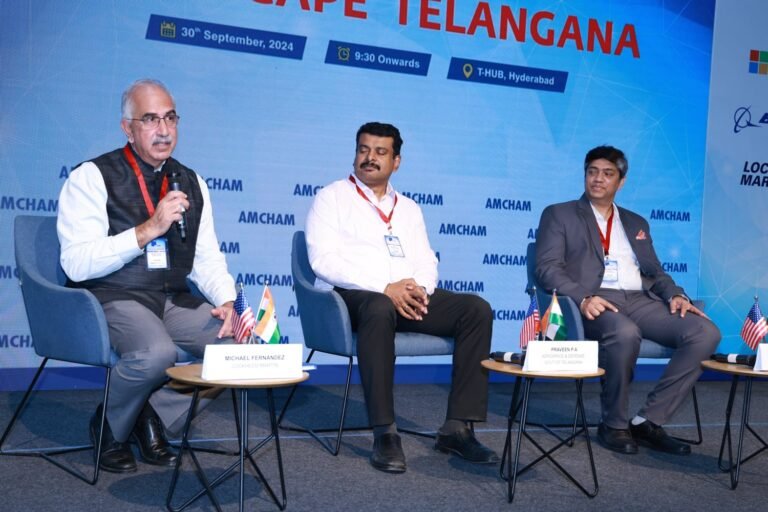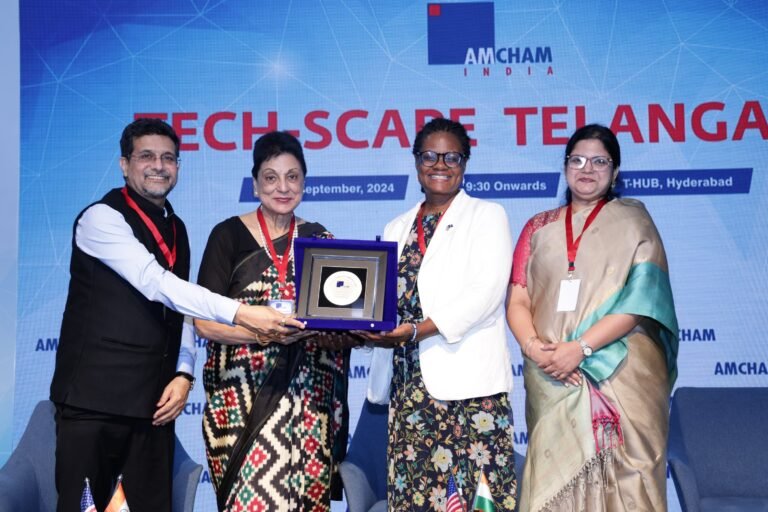Events
Past Events
Tech-Scape Telangana
The signature event of AMCHAM’s Hyderabad Chapter, ‘Tech-Scape Telangana,’ was held on September 30th at T-Hub, Hyderabad. In the inaugural session, Ms. Ranjana Khanna, Director General CEO, AMCHAM welcomed the gathering and spoke on how Telangana has been at the forefront of development with innovative policy initiatives, consistently among the top performers and ranked 2nd in ease of doing business. She also spoke on how the U.S.-India partnership can play a role in technologically transforming the landscape of the state. Mr. Divya Prakash Joshi, Co-Chairman – Hyderabad Chapter, AMCHAM and Vice President & Site Leader, Medtronic Engineering & Innovation Center, sent the stage for the event in his opening remarks and shared about Medtronic’s R&D in India. Ms. Rebekah Drame, Acting Consul General and Consular Chief, U.S. Consulate General Hyderabad, in her special address, spoke about how technological collaboration enables growth, innovation and economic development between India and the U.S. She touched upon how AI has been transforming industries globally from healthcare to education to agriculture and highlighted that the U.S-India partnership in AI is critical in driving transformation with the U.S. providing expertise in cutting-edge technologies and India offering a rich talent pool and thriving tech ecosystem. Ms. Drame mentioned that the gig economy was reshaping how people work and how businesses operate globally with India’s tech-savvy workforce poised to lead this global shift, creating opportunities for economic inclusivity. She mentioned that Telangana was rapidly emerging as a global hub for GCCs with Hyderabad a destination for skill and talent. Telangana’s pro-business environment and industrial infrastructure make it a key player in defense manufacturing and technology transfer between the U.S. and India. In her special address, Ms. Mehnaz Ansari, Sr. Regional Representative – South Asia Indo Pacific Region, U.S. Trade and Development Agency (USTDA) provided an overview of USTDA’s work in the region and shared about feasibility studies, technical assistance and reverse trade missions. She praised Telangana for being a futuristic and proactive state with Hyderabad as the epicenter with a lot of infrastructure and technology development all around.
Session 1: U.S.-India Tech Symbiosis featured a panel discussion moderated by Mr. Vivek Sonny Abraham, Senior Director, External Strategy – India & South Asia, Salesforce with Mr. Ramesh Karwani, Head Technology Policy and Regulatory Advocacy, IBM India and Mr. Subhash Chintamaneni, Head – ASIC Group, Micron India. With technology as the cornerstone for the U.S.-India partnership in Telangana, a lot of productive work in AI has been happening in Hyderabad. IBM has been doing research and development in India for the past 25 years with their 2nd largest setup in India in Telangana. Micron, which is focused on memory and storage, has their largest facility in Hyderabad where chips are designed. The panel discussed that the comprehensive growth driven by skill density and cost of talent has made Telangana the torch bearer for emerging technologies like AI, semiconductors and quantum computing.
Session 2: Enhancing Economic Development through Smart Infrastructure, Smart Mobility began with a special address by Ms. Mehnaz Ansari, Sr. Regional Representative – South Asia Indo Pacific Region, U.S. Trade and Development Agency (USTDA) who shared about how economic development and smart mobility have been a big part of U.S.-India collaboration. She talked about the many different systems included in infrastructure with transportation as a key element. She mentioned strides in aviation and smart traffic solutions and the need to collaborate more to ensure effectiveness. During the panel discussion, moderated by Mr. Sandeep Paidi, Office Managing Partner, KPMG in Hyderabad with Mr. Sreekanth Reddy, Managing Director, Hyderabad, Cushman & Wakefield and Mr. Atul Shirke, Country Manager, Turner Project Management Services, speakers discussed large scale urban development. Regarding smart cities, key challenges have been the delay due to multiple stakeholders, gap in fund management and quality issues. Starting with a tested model of a smart colony might be beneficial. USTDA could assist with the early stage of planning, and it was emphasized that the interventions need to be demonstrated well. Standards, smart power grids, procurement processes and a need for all relevant agencies to be involved were discussed. Th importance of last mile connectivity, irrefutable fact that quality costs more and sustainable construction were highlighted.
Mr. D. Sridhar Babu, Hon’ble Minister, Information Technology, Electronics & Communications; Industries & Commerce and Legislative Affairs, Government of Telangana, in his keynote address, spoke on Telangana becoming a potential force for the nation and competing at the global level. He shared about how the advent of new technologies should also improve the quality of life of citizens. He said the state, a preferred destination for tech companies and start-ups, was committed to harnessing technology disruptions and supporting industry. With an aim of global standards for AI, cyber security, IoT in manufacturing, supply chain, etc. he outlined some initiatives of U.S. industry in skilling, innovation and R&D. The Minister released the AMCHAM-Uber report ‘Shaping the Future of Work: How Digital Platforms are Creating Sustainable Opportunities in the Gig Economy’ and AMCHAM’s knowledge report ‘Enhancing the U.S.-India Collaborative Landscape in Artificial Intelligence.’
Session 3: Collaboration & Knowledge Sharing: Building a Stronger GCC Community featured speakers Mr. Ramesh Kaza, Senior Managing Director, Chief Information Officer, State Street, Mr. Jaideep Agarwal, India GBS Leader, Warner Bros Discovery and Mr. Prakash Bodla, Immediate Past Chairman – CCC Committee, AMCHAM with moderation by Mr. Kartik Ramakrishnan, Partner, KPMG in India. The session explored the success of the GCC ecosystem due to the collaboration and willingness to share learnings among other GCCs. The uniqueness of Hyderabad in collaboration between industry, government and law enforcement played a vital role in the value proposition for companies looking to set up a GCC. The panel discussed how AI could accelerate the growth of GCCs and how skilling was essential.
Session 4: Telangana: A Strategic Hub for U.S. Aerospace and Defense Companies was moderated by Mr. Michael Fernandez, India Country Head and South Asia Lead, Lockheed Martin with Mr. Praveen PA, Director Aerospace & Defence, Government of Telangana and Mr. Ajay Surti, Associate Director and General Manager, India Customer Training Center, Pratt & Whitney India. The panel discussed how strategic location, excellent ecosystem, government collaboration, and skilling were important requirements for manufacturing. With a culture of military grade manufacturing in Telangana, it’s a welcoming place for U.S. defense companies to exist and a pipeline for building the ecosystem in India was developed. With skilling as a priority, the government is also setting up skill development with universities. Within their training center, Pratt & Whitney have specific programs created for the 3rd year and final year of engineering students who are interested in aerospace or aviation. In Telangana, with high-end innovation happening, start-ups are doing cutting-edge work in aerospace. Telangana was the first state to have a drone policy and the overall support of the ecosystem makes Hyderabad the first and final stop for maintenance repair and overhaul (MRO) of aircrafts. The panel emphasized that building partnerships via joint ventures would make manufacturing stronger in the country, not just making in India, but making for the world.
The event was made possible with partners: Uber, Microsoft, Boeing and Lockheed Martin.











